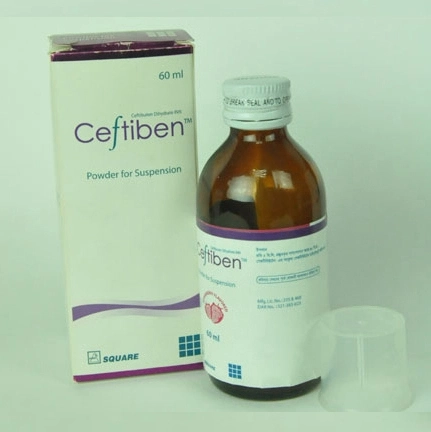Indications
Ceftiben is indicated for the treatment of individuals with mild-to-moderate infections caused by susceptible strains of the designated microorganisms in the specific conditions listed below.
- Acute Bacterial Exacerbations of Chronic Bronchitis: Due to Haemophilus influenzae (including β-lactamase producing strains), Moraxella catarrhalis (including (β-lactamase producing strains), or Streptococcus pneumoniae (penicillin-susceptible strains only).
- Acute Bacterial Otitis Media: Due to Haemophilus influenzae (including β-lactamase producing strains), Moraxella catarrhalis (including β-lactamase producing strains) or Streptococcus pyogenes.
- Pharyngitis and Tonsillitis: Due to Streptococcus pyogenes.
* রেজিস্টার্ড চিকিৎসকের পরামর্শ মোতাবেক ঔষধ সেবন করুন
Pharmacology
Ceftibuten is the dihydrate salt of Ceftibuten, is a semi-synthetic Cephalosporin antibiotic for oral administration. Ceftibuten exerts its bactericidal action by binding to essential target proteins of the bacterial cell wall. This binding leads to inhibition of cell-wall synthesis.
Dosage & Administration
Otitis Media-
- Adult Dosage: 400 mg orally every 24 hours for 10 days
- Pediatric Dosage: >6 months: 9 mg/kg/day (maximum 400 mg) every 24 hours for 10 days
- Adult Dosage: 400 mg orally every 24 hours for 10 days
- Pediatric Dosage: >6 months: 9 mg/kg/day (maximum 400 mg) every 24 hours for 10 days
- Adult Dosage: 400 mg orally every 24 hours for 10 days
- Pediatric Dosage: >12 years: 400 mg orally every 24 hours for 10 days
- Adult Dosage: 400 mg orally every 24 hours for 7 days
- Pediatric Dosage: >12 years: 400 mg orally every 24 hours for 7 days
- Adult Dosage: 200 mg orally every 12 hours for 7 to 14 days
- Pediatric Dosage: >12 years: 200 mg orally every 12 hours for 7 to 14 days
- Adult Dosage: 400 mg orally every 24 hours for 10 to 14 days
- Pediatric Dosage: >12 years: 400 mg orally every 24 hours for 10 to 14 days
- Adult Dosage: 400 mg orally every 24 hours for 10 days
- Pediatric Dosage: >6 months: 9 mg/kg/day (maximum 400 mg) every 24 hours for 10 days
* রেজিস্টার্ড চিকিৎসকের পরামর্শ মোতাবেক ঔষধ সেবন করুন
Interaction
Theophylline & Antacid do not alter the pharmacokinetic profile of Ceftiben. Ranitidine increases the Cmax & AUC of Ceftiben.
Contraindications
Ceftibuten is contraindicated in patients with known allergy to the cephalosporin group of antibiotics.
Side Effects
Nausea, headache, diarrhea, dyspepsia, dizziness, abdominal pain, vomiting.
Pregnancy & Lactation
Pregnancy Category B. There are no controlled data on the use of Ceftibuten in pregnant women. Ceftibuten should be used in pregnancy only when the benefit clearly outweighs the risk. It is not known whether Ceftibuten (recommended dosage) is excreted in human milk. Because many drugs are excreted in human milk, caution should be excercised when Ceftibuten is administered to nursing women.
Precautions & Warnings
As with other broad-spectrum antibiotics, prolonged treatment may result in the possible emergence and overgrowth of resistant organisms. Careful observation of the patient is essential. The dose of Ceftiben may require adjustment in patients with varying degrees of renal insufficiency. Ceftiben should be prescribed with caution to individuals with a history of gastrointestinal disease, particularly colitis.
Use in Special Populations
Renal Impairment-
- CrCl 5 to 29 ml/min: 2.25 mg/kg or 100 mg orally once a day
- CrCl 30 to 49 ml/min: 4.5 mg/kg or 200 mg orally once a day
Therapeutic Class
Third generation Cephalosporins
Reconstitution
- The small bottle contains purified water and large bottle contains granules
- Pour the purified water completely into large bottle
- Tighten the cap of large bottle and shake the bottle for at least one minute
- Use a measuring cup or dropper for reconstituted suspension
Storage Conditions
Store below 25°C, protected from light and moisture. For Suspension: After reconstitution, the suspension may be used for 14 days while stored at 2° to 8°C. Keep out of reach of children.

